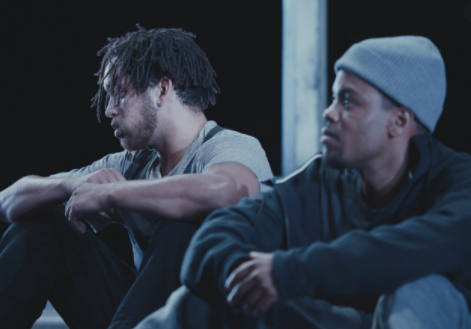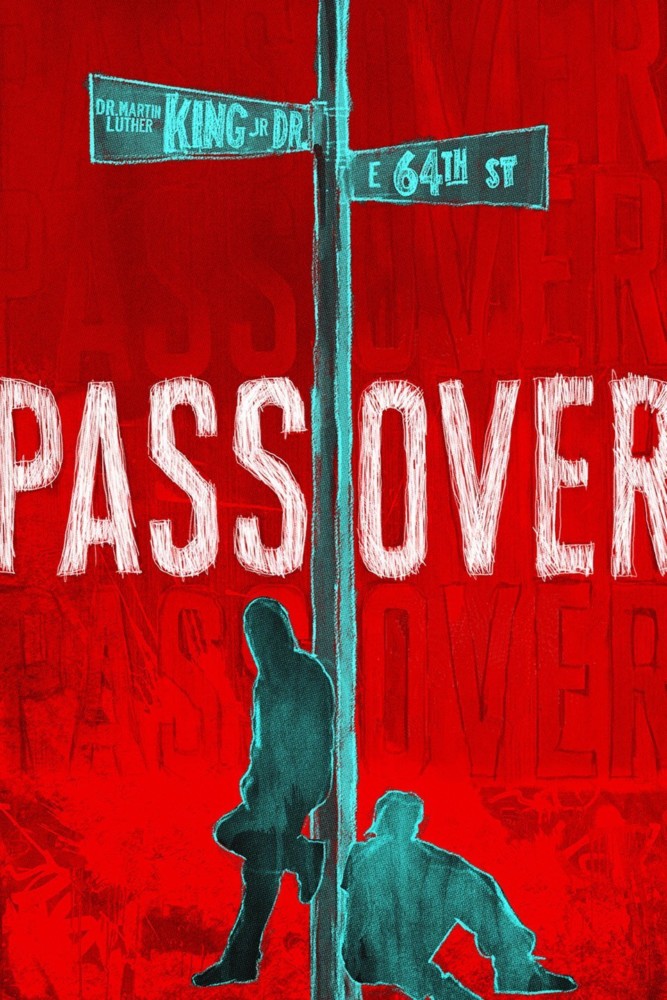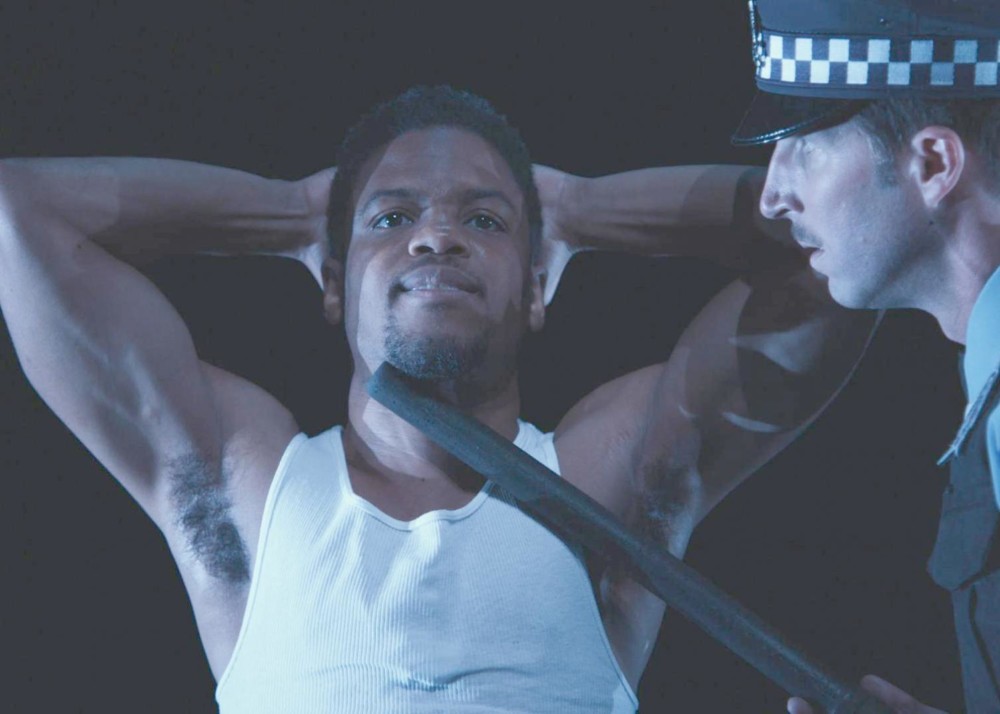
Julian Parker, Jon Michael Hill
by Carol Rocamora
It looks so familiar, doesn’t it? Two homeless men, standing along a highway… waiting … waiting …
If Beckett’s masterpiece comes to mind, that’s just what playwright Antoinette Nwandu intends. But instead of Godot, they’re waiting for “po-po” – that’s jargon for the police. And instead of salvation, they’re anticipating abuse, punishment and, ultimately, death. That’s the only outcome a young black man in the ghetto can count on.
Such is the existential state of Moses and Kitch, the “Didi” and “Gogo” of Nwandu’s searing drama Pass Over, inspired by the tragic Trayvon Martin shooting in 2012. It had its premiere at Chicago’s Steppenwolf Theatre in 2017 and then moved on to Lincoln Center Theatre’s LCT 3 stage in 2018.
So powerful is its punch, so painful is its relevance, that director Spike Lee jumped on the opportunity to film a live performance at Steppenwolf at the end of 2017. And now it’s live streaming on Prime Video, at a time when George Floyd’s tragic death in May by police brutality has our country in its grip.
Beckett’s bleak landscape in Waiting for Godot, featuring two tramps waiting for salvation that will never come, is the ideal setting for Nwandu’s own vision. Her pair features Moses (Jon Michael Hill) and Kitch (Julian Parker), two black youths, hanging out on a street corner in an American city. Instead of Beckett’s lonely tree (the only scenic element), Designer Wilson Chen’s bleak set features a single street sign reading “Martin Luther King, Jr., Drive and 64th Street” (the address suggests Chicago).


Like Didi and Gogo, Moses and Kitch are homeless, passing the time waiting:
“What you fixin’ ta do today?”
“I don’ know, man…what you fixin’ ta do?”
It’s their daily, circular conversation, apparently, punctuated by absurdist fantasy games (“Room service! Caviar”!) and antic acrobatics, just to pass the time. But their banter is regularly pierced by gunshots – causing them to fall to the ground in dread anticipation. Like Didi and Gogo, they can’t shake the fear of a hostile, threatening world around them.
Still Moses and Kitch have a dream, like Didi and Gogo’s – of salvation, laced with Biblical references.
“I got plans to get up off this block”.
“Where you gonna go?”
“Cross the River Jordan”
“To the Promised Land…
If they can only get past the “po-po” who are trying to shoot them before they can pass over…
Meanwhile, their dreams are interrupted by two ominous visitors. The first is a white man in a white suit – like Beckett’s Pozzo (after whom he’s modeled), but nicer, at least at first. He offers to share the contents of his picnic basket with Moses and Kitch – including collard greens and beans (one of numerous stereotyping references in the play.) But then when he states his name – “Master” – he reveals his true intentions. “Everything’s mine!” Master (Ryan Hallahan) cries to the cowering youths. He will return later in the play to prove it.
In contrast, the second visitor – a white policeman named “Ossifer” (Blake Delong) – wastes no time in getting down to the business of brutalizing and humiliating the cowering pair.
And so it goes for Moses and Kitch – an endless cycle of waiting, punctuated by gunshots and intrusions from a hostile world. Still, they keep dreaming – until the play’s dramatic and traumatic denouement (no spoiler – but it’s shocking, and an absolutely must-see).


Jon Michael Hill, Blake Delong
Spike Lee has chosen a brilliant framing technique to intensify the impact of this powerful play. He begins with film footage of an all-black audience arriving by bus at Chicago’s Steppenwolf Theatre. He then films their response throughout the performance of the play Pass Over, (beautifully directed by Danya Taymor), underscored by Howard Drossin’s haunting original music on clarinet and oboe. The result is a play-within-a-film, with the audience serving as a Greek chorus responding to the suffering of black America.
As Moses and Kitch, the talented Jon Michael Hill and Julian Parker are heartbreaking – young, funny, bright, and full of “hopeless hope” (as Eugene O’Neill, our great American tragedian, would call it). As Master, Ryan Hallahan is chilling – so is Blake Delong in the role of the brutal police officer “Ossifer” who receives the surprise of his life at the play’s en
At one of the play’s most moving moments, Moses and Kitch recite the names of their friends struck down before their time by police shootings. As they call out their names, we’re reminded of the real, tragic list: Eric Garner (father of six, “I can’t breathe”, New York City, July 17, 2014); Michael Brown (age 18, Ferguson, August 9, 2014), Tamir Rice (age 12, Cleveland November 14, 2014), among numerous others – most recently, George Floyd (Minneapolis, May 25, 2020).
For them, Nwandu’s Moses offers a prayer in this beautiful, deeply moving play:
“Get up off this block.
Walk right to the river Jordan
We gonna stand there like chosen
River gonna part, just for us,
Ain’t gonna be no jail no mo’
No plantation…gonna be sweet, so sweet
Like milk and honey…”
Pass Over, a film produced and directed by Spike Lee, featuring Antoinette Nwandu’s play Pass Over, directed by Danya Taymor, now available on Prime Video.

















